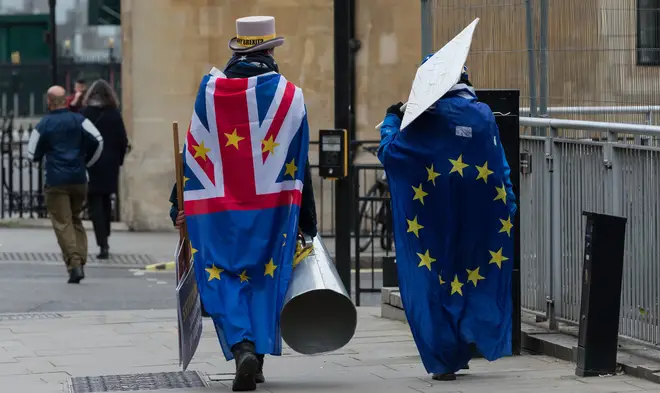
Shelagh Fogarty 1pm - 4pm
3 December 2020, 20:46 | Updated: 3 December 2020, 20:51

The chances of reaching a post-Brexit trade deal are "receding" due to fresh demands from the EU "at the eleventh hour", the UK Government has said.
Hopes of the UK and the European Union reaching a trade agreement by the end of the week were dealt a blow on Thursday after the EU brought "new elements into the negotiation".
Britain's current trading arrangement with Europe will expire at the end of the month, giving the two sides little time to agree on a deal and have it ratified by the bloc's leaders, Westminster and the European Parliament.
A senior UK Government source said on Thursday: "At the 11th hour, the EU is bringing new elements into the negotiation.
"A breakthrough is still possible in the next few days but that prospect is receding."
It comes following further crunch talks in London between teams led by Lord David Frost and his European counterpart Michel Barnier.
Read more: Controversial Brexit legislation set to be reinstated
Watch: It would be inexplicable if a Brexit deal isn't reached - Hilary Benn

Hilary Benn has the latest on Brexit negotiations
Despite the talks hanging in the balance, Boris Johnson will uphold plans to allow the government to rip up the Brexit divorce deal - which the UK has already signed.
Ministers will ask MPs to reinstate controversial legislation - removed by the House of Lords - that will allow Britain to break international law by ignoring provisions in the Withdrawal Agreement (WA) relating to Northern Ireland.
On Monday, the Commons will vote on the legislation in question, the UK Internal Market Bill, which, if approved, could further disrupt negotiations that are already on the brink.
The EU has already taken the first steps in filing legal action against the Bill.
Mr Johnson's official spokesman said: "We have been clear that those clauses represent a legal safety net to protect the integrity of the UK's internal market and to protect the huge gains of the peace process."
Read more: Lack of readiness means ‘serious risk of disruption’ at Channel
Watch: Former easyJet CEO explains why the airline opposed Brexit

Nick Ferrari pushes Gove on Brexit fisheries sticking point
Asked if that would include the power to waive tariffs on goods crossing the Irish Sea, the spokesman said the details would be set out next week.
The government will also introduce the Taxation (Post-Transition Period) Bill, which includes "measures which are required to prepare for the end of the transition period" that could override parts of the divorce deal agreed on by the prime minister in 2019.
However, speculation in Westminster suggests No 10 could retract the controversial measures if a trade deal is struck.
Earlier on Thursday, Ireland's foreign minister Simon Coveney said there was a "good chance" of a deal being agreed.
"It's the time to hold our nerve, to trust Michel Barnier, who has done a phenomenal job to date," Mr Coveney told Newstalk.
"I believe, if we do that, there's a good chance that we can get a deal across the line in the next few days."

Caller paints "chilling" picture of post-Brexit UK countryside
However, he suggested there was a scale of concern in Europe about Britain's Internal Market Bill, adding that despite believing the UK wants a deal, "they don't always behave like that".
Elsewhere, businesses are frustrated with the uncertainty around trading arrangements once the UK leaves the single market and customs union at the end of the year.
Tesco chief executive Ken Murphy told Sky that the supermarket giant was preparing for a No Deal scenario.
"The biggest challenge we face really is the movement of product between borders, the movement of product between Great Britain and Northern Ireland and, of course, between mainland Europe and the UK," he said.
"That's the one area where we really would urge the government to give us some clarity and to allow us to prepare even better for the end of December."

George Eustice says Brexit trade deal must be sorted this week
Fishing and the so-called "level playing field" aimed at preventing unfair competition on state subsidies and standards remain the main issues to be resolved in the talks.
Reports have suggested that the UK has watered down its demands for control of fishing rights, by asking EU fishing fleets to hand over up to 60 per cent of the value of stocks currently caught, rather than the 80 per cent previously sought.
But this falls short of EU demands in one of the most symbolically important aspects of the negotiations.
Meanwhile, the Labour Party is divided over how to vote on a deal if it reaches the Commons, with senior figures split on whether to support it or abstain.
Sir Keir Starmer confirmed the varying opinions within the party but stressed that a trade agreement with the EU was "in the national interest".
The Labour leader said: "Of course there are different opinions, as you would expect, but we will pull together, discuss it as a team and be united."